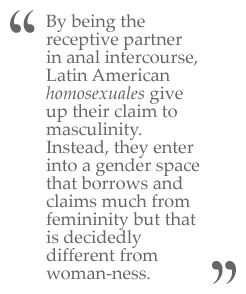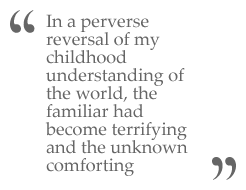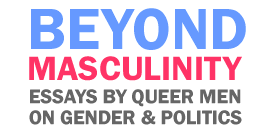 This in-between homosexual gender is centered on the matter
of penetration: he who is penetrated is a homosexual. By
being the receptive partner in anal intercourse, Latin
American homosexuales give up their claim to
masculinity. Instead, they enter into a gender space that
borrows and claims much from femininity but that is
decidedly different from woman-ness. This articulation
of homosexuality as a different gender, which
essentializes it as a biological trait, creates spaces
for Latin American homosexuales within Latin
American societies and families. These spaces are often
created not by the overt presence of homophobic
discourses, but instead by their silent operation. Queer
Puerto Rican sociologist Manolo Guzmán, in his critical
examination of scholarship on homosexuality in Puerto
Rico, describes this further:
This in-between homosexual gender is centered on the matter
of penetration: he who is penetrated is a homosexual. By
being the receptive partner in anal intercourse, Latin
American homosexuales give up their claim to
masculinity. Instead, they enter into a gender space that
borrows and claims much from femininity but that is
decidedly different from woman-ness. This articulation
of homosexuality as a different gender, which
essentializes it as a biological trait, creates spaces
for Latin American homosexuales within Latin
American societies and families. These spaces are often
created not by the overt presence of homophobic
discourses, but instead by their silent operation. Queer
Puerto Rican sociologist Manolo Guzmán, in his critical
examination of scholarship on homosexuality in Puerto
Rico, describes this further:
…this absence of speech,
no longer talking about things like marriage, represents
a suspension of the assumption of heterosexuality. There
is enormous amount of room for the expression of
homosexuality under this absence of speech about
homosexuality. [ 10 ]
It is
in those spaces of absent speech in which Latin American
homosexuality rests. My own parents’ response to my
budding gender deviance and homosexuality was shaped by
this system of homosexual gender. My family’s acceptance
of my queer impulses was predicated on its safe
containment in the traditional queer gender space of the
Latin American family structure. So long as my
homosexuality was not explicitly named it did not
threaten the traditional supremacy of my father over our
family.
Despite the impossibility of drawing neat
divisions between different cultures’ configurations of
homosexuality, there are important differences between
the Latin American homosexuality system of my childhood
and the U.S. gay identity system that I encountered as a
teenager coming out as queer. Central to American
gayness is the individual and her/his choice: a person
becomes gay through a public declaration that is an
expression of their will to identify as gay. While
gender deviance is often vigorously labeled as gay by
heterosexuals, it is only through the individual
person’s declaration that gayness becomes real. The
intimate relation between American gayness and
individual identity is a product of the historical
circumstances in which gayness in the United States
emerged.
Queer historian John D’Emilio, in his
path-breaking investigation of the origins of gay
homosexuality in the United States, firmly ties the
emergence of gayness with the supremacy of the
individual that is only possible under capitalist
ideological and material conditions. D’Emilio argues
that the rise of the individual laborer system of
capitalism in the latter part of the 19th
century replaced the family with the individual as the
primary economic actor. This shift created the material
conditions in which individual men could financially
support themselves and be free to explore their personal
desires, whatever they may be. It was this economic
emancipation that led to the coming out of American
gayness. [ 11 ]
Unlike my family, the teachers and students at my
schools presented me with a homosexuality that was based
on clearly defined lines between sexualities and
genders. In the world of the elementary schoolyard you
were either a boy or a girl and if you deviated from
either of these strictly defined categories, you were
harassed. As a boy child that hung out with the little
girl cliques, other boys called me a “fag.” I had never
experienced such rejection before in my life and it was
because of that rejection that I began to question my
sexuality and gender. As I grew older, I understood that
to be different from the normal script of heterosexual
boyhood meant loneliness. So to avoid isolation, I
attempted to pass for straight and put away the gay. My
attempts to be straight failed and as I entered
adolescence I struggled for a language that could define
the feelings that I felt inside. Only seeing the world
of gay and straight around me, I chose to call myself
gay.
When
I was 16 years old, I came out. My life-long attraction
to boys and affinity for feminine things could no longer
be contained in the quiet space my family offered.
Nurtured by classical gay discourses of personal
liberation and empowerment, I militantly claimed an
identity of gayness in opposition to my family. I
demanded that my deviance be named and recognized by not
only my family, but all who knew me. Rainbow flags
blazin’, I flaunted my new found American gayness for my
own personal fulfillment regardless of its affects on my
family. In doing so, I ruptured the life-long unnamed
place in my family that had contained my deviance.
As I
struggled against homophobia, I sought to create spaces
at home and school that nurtured my growing oppositional
queer identity. The challenge I presented to my family’s
containment of my gayness caused numerous battles
between every member of my family and me. In particular,
I remember a brutal shouting match between my mother and
I that was triggered by a garland of hickies around my
neck freshly-given to me by my then boyfriend. Again and
again, my mother yelled at me that I was selfish, out of
control and ungrateful. I skillfully deployed against
her the new language of gay empowerment I had mastered.
She was a homophobe, ignorant, and oppressing me.
 Those
clashes were fundamentally about how I would be part of
my family. Would I be a private gender deviant
containable within the structure of the family, or would
I be a public individual American-style gay? Sadly, my
dichotomous thinking led me to cast my family as a site
of oppression and the world outside as a place of
liberation. In a perverse reversal of my childhood
understanding of the world, the familiar had become
terrifying and the unknown comforting.
Those
clashes were fundamentally about how I would be part of
my family. Would I be a private gender deviant
containable within the structure of the family, or would
I be a public individual American-style gay? Sadly, my
dichotomous thinking led me to cast my family as a site
of oppression and the world outside as a place of
liberation. In a perverse reversal of my childhood
understanding of the world, the familiar had become
terrifying and the unknown comforting.
Despite all of my
seeming certainty that my gay individuality was better
than the queerness my family had long nurtured, inside I
felt a nagging uneasiness. Despite knowing that I was
empowered, I felt isolated. The embracing connectivity I
had felt as a child within my family was no where to be
found in the gay bars and clubs that I so desperately
searched for community. It was that growing emptiness
that led me to question some of the assumptions I had
made when I came out. I now asked myself whether
empowerment and liberation had to wear the mask of white
American gayness? The asking of this question has
propelled me towards what I hesitantly call a
mestiza/o gender... (continue reading)




5 COMMENTS ON THIS ESSAY:
Great essay!Very proud of you for writing this.
GREAT ESSAY!!! good work.
amazing!
i'm so very proud of you, Daniel.
hello daniel
i was wondering, is there maybe a spanish version of your article?
(i would like a spanish/french friend of mine who's lived in latin america for some years to read your piece, and english is difficult for her)
daniel mang
toulouse/france